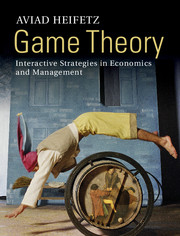Book contents
- Frontmatter
- Contents
- Foreword
- Part I Strategic interactions as games
- Part II Basic solution concepts for strategic form games
- Part III Prominent classes of strategic form games
- 7 Cooperation and conflict, strategic complements and substitutes
- 8 Concentrated markets
- 9 Coordination games and strategic uncertainty
- Part IV Uncertainty and mixed strategies
- Part V Advanced topics in strategic form games
- Part VI Dynamic games
- Part VII Repeated games
- Index
- References
9 - Coordination games and strategic uncertainty
from Part III - Prominent classes of strategic form games
Published online by Cambridge University Press: 05 August 2012
- Frontmatter
- Contents
- Foreword
- Part I Strategic interactions as games
- Part II Basic solution concepts for strategic form games
- Part III Prominent classes of strategic form games
- 7 Cooperation and conflict, strategic complements and substitutes
- 8 Concentrated markets
- 9 Coordination games and strategic uncertainty
- Part IV Uncertainty and mixed strategies
- Part V Advanced topics in strategic form games
- Part VI Dynamic games
- Part VII Repeated games
- Index
- References
Summary
In 1753, the Academy of Dijon in France announced an essay contest on the topic of: “What is the origin of inequality among men, and is it authorized by the natural law?”
Jean-Jacques Rousseau took up the challenge, and wrote his discourse on “The Origin and the Foundation of Inequality among Men”. This essay (together with his later book, “The Social Contract, or Principles of Political Right,” published in 1762) became one of the cornerstones of the social sciences and political philosophy.
Rousseau secluded himself for a week in the Forest of St Germain to muse about what human life was like at the dawn of civilization, and completed the discourse upon returning to Paris. In his discourse, Rousseau describes human evolution from the primordial era of the “savage” to the age of the social order of “civilized man.”
In the first part of his discourse, Rousseau describes the “savage” or natural man who lived a life of instinct in Nature, innocent of alienation and inequality. In the second part, he goes on to describe the gradual process whereby social and political organization-forming activity took shape, providing man with security and technological progress, but also bringing inequality, wars and alienation in its wake. Rousseau describes the beginning of social cohesion as follows
Taught by experience that the love of well-being is the sole motive of human actions, he found himself in a position to distinguish the few cases, in which mutual interest might justify him in relying upon the assistance of his fellows; and also the still fewer cases in which a conflict of interests might give cause to suspect them. In the former case, he joined in the same herd with them, or at most in some kind of loose association, that laid no restraint on its members, and lasted no longer than the transitory occasion that formed it. In the latter case, every one sought his own private advantage, either by open force, if he thought himself strong enough, or by address and cunning, if he felt himself the weaker.
- Type
- Chapter
- Information
- Game TheoryInteractive Strategies in Economics and Management, pp. 137 - 156Publisher: Cambridge University PressPrint publication year: 2012



